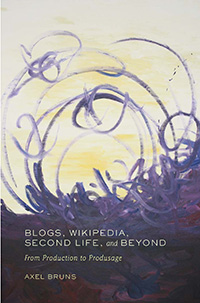You are here
Reading Sample 3 - Produsage and Technology
Below is the third of four reading samples from Blogs, Wikipedia, Second Life, and Beyond: From Production to Produsage. These samples were first published as part of a series on the P2P Foundation Website, where the book was honoured as Book of the Week.
In this series:
- Produsage: An Introduction
- Folks and Experts
- Produsage and Technology
- Produsage and Democracy
3 - Produsage and Technology
The emergence of produsage itself can be seen simply as a symptom of a wider informationalization of all aspects of our everyday lives, our economy, our society. With the help of technological advances, information is being embedded ever more deeply into all aspects of life, but this is not a process driven by technology as such; indeed, perhaps it would be more correct to say that our networked information and communication technologies have helped merely to make more notable, more visible, more explicitly extractable and usable, the information and knowledge which was already always, inherently, necessarily embedded in all aspects of human existence, action, and interaction. Technology, in this view, is merely a support mechanism serving to connect and amplify processes of information use and knowledge generation which have always been a fundamental aspect of human life; it helps address what Lévy describes as a central problem for collective intelligence,
that of discovering or inventing something beyond writing, beyond language, so that the processing of information can be universally distributed and coordinated, no longer the privilege of separate social organisms but naturally integrated into all human activities, our common property. [1]
Produsage adds to this by providing a system which enables this broad-scale participation in collective intelligence without channeling it necessarily through the processes of conventional production; removing commercial and other filters which operate through an imposition of hierarchical structures determining a priori what knowledge and what participants are to be seen as most valuable, or most likely to be valuable - by contrast, it allows such structures to emerge from within the process, from within the community, and from within the commons itself. "Building the commons has a crucial ingredient: the building of a dense alternative media network, for permanent and collective self-education in human culture, away from the mass-consumption model promoted by the corporate media." [2] This, too, may be understood not so much as a new development, but merely as the rediscovery of older patterns of human interaction and collective intelligence extant in a preindustrial age, of course.
Ultimately, then,
this new human dimension of communication should obviously enable us to share our knowledge and acknowledge it to others, which is the fundamental condition for collective intelligence. Beyond this are two major possibilities, which could radically transform the fundamental data of social life. First, we will have at our disposal simple and practical means for knowing what we are doing as a group. Second, we will be able to manipulate, much more easily than we are able to write, the instruments for collective utterance. This will … take place … in keeping with the size and speed of the enormous turbulence, deterritorialized processes, and anthropological nomadism that we are now subject to. [3]
But we should not simply assume that such shifts to collaborative processes of produsage will continue unhindered, or that they are not themselves open to diversion through commercial or other interests. Although it remains as yet unclear exactly what direct benefits, if any, News Corporation will derive from its acquisition of MySpace, and what effects the clash of its conventional, top-down, corporate culture with the bottom-up social network of MySpace will generate, this corporate embrace (and perhaps enclosure) of social networking environments and produsage sites more generally-as we have also already seen it in our examination of corporately owned online gaming environments, for example-raises serious questions for a future in which more and more of our activities of social interaction and social networking may take place in such online environments. Benkler suggests, for example, that the winners from a shift to what he describes as 'commons-based peer production' "would be a combination of the widely diffuse population of individuals around the globe and the firms or other toolmakers and platform providers who supply these newly capable individuals with the context for participating in the networked information economy" [4]; what remains unclear from this description, however, is the exact manner in which the corporate players in this process would be likely to extract their winnings from the social commons.
Again, here, we can envision a variety of more or less benign possibilities; it is certainly conceivable that significant corporate earnings can be generated simply from advertising and other ancillary practices which harness the level of interaction in produsage communities without directly or substantially affecting that interaction itself. In addition, and more problematically, the content generated by produsers may also be harvested and on-sold for commercial gain; this would be acceptable as long as it respects the community's own intentions for how its work would be used, and does not operate simply under cover of legal but essentially unethical end-user license agreements. Harboring the community itself may also be able to generate substantial income flow, where the harboring services themselves are such that community members will happily pay one-off or continuous service fees, but at the same time it also raises the specter of community hijack: fee structures may be altered, and corporate governance rules changed, without consultation with a community whose strong buy-in to an existing site might make it prohibitively difficult for it to take its contents and social networks and move on to a different, more benevolently governed environment.
[…]
Concerns over the commercial enclosure of produsage are significantly reduced, however, if we realize that the networked information technologies which have helped us to rediscover vernacular creativity and cultural engagement, and to channel such activities into produsage proper, also enable us to develop many forms of produsage which no longer require the existence of a central, unified space or environment; increasingly, as the blogosphere, filesharing networks, and folksonomic content tagging activities all demonstrate at present, produsage can also take place as a massively distributed, decentralized activity. Today, such spaces can no longer be enclosed through commercial, legislative, or other top-down processes: their contributors form loose and non-committal networks only, and may not even be fully aware of the networks to which they belong; they are connected through the use of shared technological frameworks either intentionally (through their own efforts to engage with one another) or through automatic means. Such interconnections are increasingly enabled through the further development of technologies which facilitate them, including Application Programming Interfaces (APIs) and the AJAX frameworks which form the basis for Web 2.0; they enable the further disconnection of content from the spaces in which it originates. To the extent that they are effectively policed, these environments are policed by the community itself as it develops social and technological norms which facilitate the effective exchange and engagement between nodes within the overall distributed network.
- Pierre Lévy, Collective Intelligence: Mankind's Emerging World in Cyberspace, trans. Robert Bononno (Cambridge, Mass.: Perseus, 1997), p. xxviii.
- Michel Bauwens, "Peer to Peer and Human Evolution," Integral Visioning, 15 June 2005, http://integralvisioning.org/article.php?story=p2ptheory1 (accessed 1 Mar. 2007), p. 3.
- Lévy, p. xxviii.
- Yochai Benkler, The Wealth of Networks: How Social Production Transforms Markets and Freedom (New Haven, Conn.: Yale University Press, 2006), p. 380.
- Log in to post comments
- 8167 reads
 Printer-friendly version
Printer-friendly version


